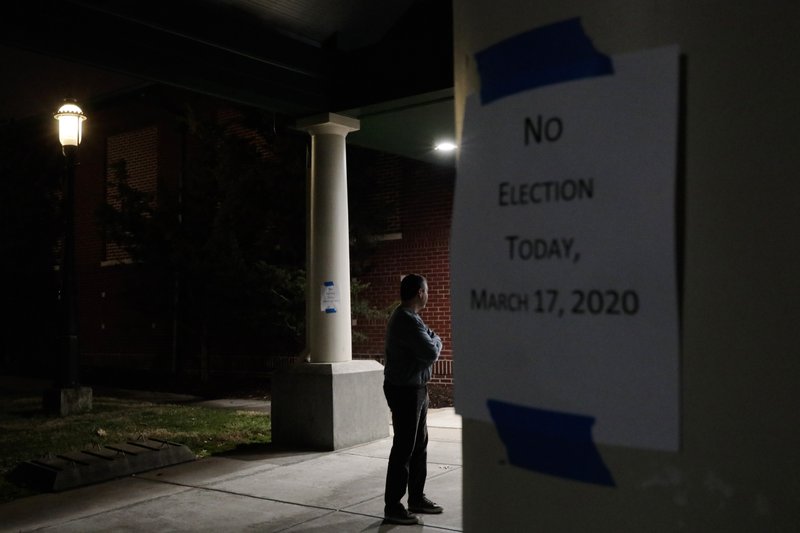ATLANTA -- U.S. elections have been upended by the coronavirus pandemic. At least 13 states have postponed voting and more delays are possible as health officials warn that social distancing and other measures to contain the virus might be in place for weeks, if not months.
The states that have yet to hold their primaries find themselves in a seemingly impossible situation as they look to balance public health concerns with the need to hold elections. While election officials routinely prepare for natural disasters such as hurricanes and wildfires, the virus outbreak poses a unique challenge.
"Usually when we are dealing with a crisis in elections, it's something that happens and then it's done," said Chris Harvey, Georgia's director of elections. "The difference now is that it's a spreading threat, a fast-growing threat. We don't know where, when or how it is going to end."
Primaries scheduled for Georgia, Ohio, Maryland, Indiana, Louisiana, Connecticut and Kentucky have all been postponed to May or June. The Rhode Island Board of Elections has recommended the primary be delayed to June, while officials in Wisconsin are debating what to do.
[CORONAVIRUS: Click here for our complete coverage » arkansasonline.com/coronavirus]
Wisconsin Gov. Tony Evers has insisted the April 7 primary be held as scheduled, but a state elections commissioner said this past week that doing so would put people at risk. The state's chief elections official cited a host of problems Wisconsin could face if it moved forward with the election -- a poll worker shortage, lack of polling places and potential disruption of absentee voting if mail service in the U.S. were to shut down.
All this comes at the worst possible time for election officials, in the middle of a major election year. The virus outbreak occurred halfway through the presidential primary season. Voters in 23 states have yet to cast their ballots.
While Arizona, Florida and Illinois held their elections as scheduled Tuesday, Ohio halted voting over public health concerns after federal officials encouraged people over age 65 to stay home.
The states that have opted to press ahead have found themselves dealing with what one Chicago elections official called a "tsunami" of cancellations by poll workers, who tend to be older, and a last-minute scramble to relocate polling places away from nursing homes and senior living communities. Severe illness and death associated with coronavirus has been most common in people 65 and older, especially those who have heart disease or other chronic conditions.
In addition to the presidential race, dozens of congressional and local primaries are in limbo.
Primaries play an important role in deciding which party candidates will appear on the ballot for the November general election.
Runoff elections in Alabama, Texas and Mississippi were also delayed, as were local elections in Oklahoma, Missouri and New Jersey.
There's no indication May or June will be any better to hold elections, but officials say postponing voting even for a few weeks gives them an opportunity to put in place plans to keep the public safe while voting.
This includes moving polling places, recruiting backup poll workers and acquiring enough cleaning supplies for voting sites.
There have been calls, including from Democratic National Committee Chairman Tom Perez, for elections to be held mostly by mail. But making this switch will be difficult for some and impossible for others.
In several states, it would take legislation or even a constitutional amendment to allow.
Even then, election experts say there would be costs and logistical hurdles.
For instance, states would have to decide whether taxpayers or individual voters would be responsible for return postage.
It would require new machines and software in many places to track ballots in the mail and process and count them when they're returned.
Further, advocates say not all voters can fill out ballots by hand and that sending ballots could miss some voters, such as Native Americans who live on reservations where mail isn't delivered to every home.
Looming over the scramble over the primaries are worries about the general election in November, a date that is set by federal law.
Federal legislation has been proposed that would have all voters receive a mail-in ballot for the November election and provide federal funds to help states cover the costs.
The Brennan Center for Justice at NYU's School of Law is calling for task forces in every state to implement plans for executing an election amid a pandemic and urging Congress to provide money to help states. They estimate their proposals, including universal mail-in voting, could cost up to $2 billion.
Information for this article was contributed by Geoff Mulvihill of The Associated Press.
A Section on 03/22/2020
